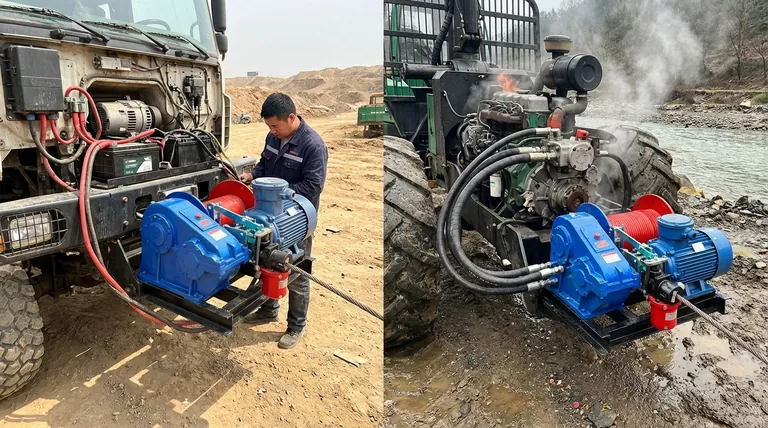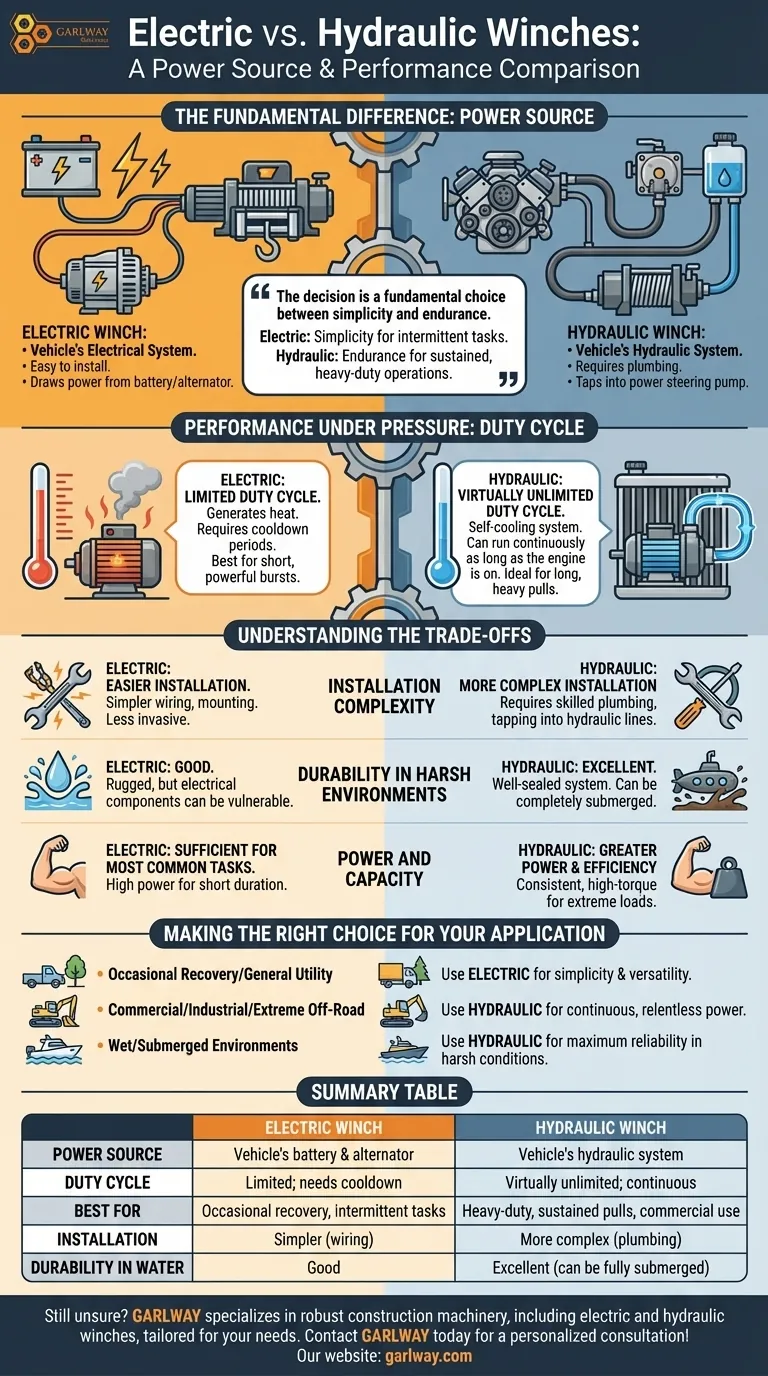The fundamental difference between electric and hydraulic winches is their power source. Electric winches draw power from a vehicle's electrical system via a dedicated motor, making them relatively easy to install and suitable for most common tasks. Hydraulic winches tap into a vehicle's existing hydraulic system, such as the power steering pump, to deliver consistent, heavy-duty pulling power without the risk of overheating.
The decision between an electric and hydraulic winch is a fundamental choice between simplicity and endurance. Electric winches offer straightforward installation for intermittent tasks, while hydraulic winches provide relentless power for sustained, heavy-duty operations.

The Core Difference: Power Source and System Integration
Understanding how each winch gets its power is the key to understanding its ideal application. The power source dictates installation complexity, performance characteristics, and overall system reliability.
How Electric Winches Work
An electric winch is a self-contained unit consisting of an electric motor, brake, gearbox, and drum. It connects directly to the vehicle's battery and alternator.
This design makes installation a relatively simple wiring task. It can be operated even when the vehicle's engine is off, though this will rapidly drain the battery.
How Hydraulic Winches Work
A hydraulic winch is driven by hydraulic fluid pressure. It must be plumbed into a hydraulic pump, which is most often the vehicle's power steering pump.
This requires a more complex installation involving hydraulic lines and fluid. Because it relies on the pump, the vehicle's engine must be running for the winch to operate.
Performance Under Pressure: Duty Cycle and Power
The most significant operational difference emerges when the winches are put to work, especially for extended periods. This is a concept known as the "duty cycle."
The Electric Winch's Limitation: Heat
Electric motors generate significant heat under heavy load. This means they have a limited duty cycle—they can only run for a short period before needing to cool down to avoid damage.
They are excellent for short, powerful bursts of pulling but are not designed for continuous operation. Heavy use can also put a severe strain on a vehicle's battery and alternator.
The Hydraulic Winch's Advantage: Continuous Power
Hydraulic systems are inherently self-cooling, as the hydraulic fluid circulates and dissipates heat. This gives them an almost unlimited duty cycle.
A hydraulic winch can pull for as long as the vehicle's engine is running, making it the superior choice for long, slow, and heavy pulls common in commercial and industrial settings.
Understanding the Trade-offs
Neither winch type is universally better; they represent a distinct set of compromises. Choosing the right one depends on balancing performance needs with practical realities.
Installation Complexity
Electric winches are far easier to install. The process primarily involves mounting the winch and running electrical cables to the battery.
Hydraulic winches require a more invasive and skilled installation. Tapping into the power steering system involves cutting lines and fitting new hoses, which demands mechanical expertise.
Durability in Harsh Environments
While both can be rugged, hydraulic systems have an edge in extreme conditions. They are typically well-sealed systems that are less susceptible to water and mud.
Their ability to be completely submerged gives them a significant advantage in deep water crossings or marine applications.
Power and Capacity
For the most extreme loads, hydraulic winches often offer greater pulling power and higher efficiency. Their design is mechanically suited for consistent, high-torque applications without the risk of electrical failure under strain.
Making the Right Choice for Your Application
Your final decision should be guided by a realistic assessment of your most common and most demanding use cases.
- If your primary focus is occasional vehicle recovery or general utility: An electric winch is the ideal choice for its ease of installation, versatility, and excellent performance for intermittent tasks.
- If your primary focus is commercial, industrial, or extreme off-road use: A hydraulic winch is superior for its ability to pull continuously without overheating and its exceptional durability.
- If your primary focus is maximum reliability in wet or submerged environments: The sealed nature of a hydraulic system gives it a distinct advantage for dependable operation in the harshest conditions.
Ultimately, matching the winch's core operating principle to your specific workload is the key to safe and effective performance.
Summary Table:
| Feature | Electric Winch | Hydraulic Winch |
|---|---|---|
| Power Source | Vehicle's battery & alternator | Vehicle's hydraulic system (e.g., power steering pump) |
| Duty Cycle | Limited; needs cooldown periods | Virtually unlimited; can run continuously |
| Best For | Occasional recovery, intermittent tasks | Heavy-duty, sustained pulls, commercial use |
| Installation | Simpler (wiring) | More complex (plumbing into hydraulic system) |
| Durability in Water | Good | Excellent (can be fully submerged) |
Still unsure which winch is right for your project?
GARLWAY specializes in providing robust construction machinery, including electric and hydraulic winches, concrete mixers, and batching plants, tailored for construction companies and contractors worldwide. Our experts can help you select the perfect equipment for your specific job requirements, ensuring maximum efficiency, durability, and performance.
Contact GARLWAY today for a personalized consultation and get the reliable power you need!
Visual Guide

Related Products
- Electric and Hydraulic Winch for Heavy Duty Applications
- Electric 120V Boat Winch by Badlands
- 12000 lb Heavy Duty Electric Boat Winch
- Heavy Duty Electric Boat Winch Windlass Anchor
- Electric Hoist Winch Boat Anchor Windlass for Marine Applications
People Also Ask
- How are trailer winch sizes determined? Match Capacity to Your Boat's Weight for Safe Loading
- Can a winch be used as a hoist? The Critical Safety Differences Explained
- How to calculate windlass capacity? Ensure Safe and Efficient Anchor Retrieval
- What is the single rope traction force of the quick winch without a pulley block? 0.5 to 40 Tons Explained
- What protective gear should be worn while operating an electric winch? Essential Safety Equipment for Safe Winching
- What principle do all winding systems follow? The Counterweight Secret to Efficient Mining
- What distance should be maintained while the winch is in operation? Defining the Critical Safety Zone
- What are the benefits of consistent lifting power in electric hoists? Boost Productivity & Safety














